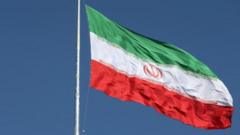A Swiss national alleged to be involved in espionage has reportedly died in custody in Iran, prompting scrutiny over the nation's treatment of detainees and the broader implications for international relations.
Swiss National Dies in Iranian Custody Amid Espionage Allegations

Swiss National Dies in Iranian Custody Amid Espionage Allegations
A Swiss citizen's death in an Iranian prison raises concerns over human rights and diplomatic tensions.
The Swiss citizen was in a prison in Semnan when he reportedly committed suicide, according to Iranian state media. The report from Iran's semi-official Tasnim News Agency indicated that the individual was arrested on espionage accusations and that prison officials made efforts to save him, which reportedly failed. Mohammad Sadegh Akbari, Semnan's chief justice, confirmed the incident, expressing that the case was under investigation. The identity of the deceased remains undisclosed. The Swiss Foreign Affairs Department has also acknowledged the situation and is communicating with Iranian authorities regarding the case.
This incident is under the backdrop of Iran's history of detaining foreign nationals, particularly dual citizens, often on espionage charges. In the past several years, numerous Americans and Europeans have been apprehended under similar pretenses, spawning debates over the motivations behind such arrests—widely seen as a means for Iran to leverage negotiations or to extract concessions from other nations.
Switzerland, which holds a unique position as a mediator in Washington-Tehran dialogues, has previously acted on behalf of U.S. interests in Iran, further complicating the diplomatic landscape. As the case develops, questions arise about the treatment of prisoners in Iran, with international human rights organizations calling for increased transparency in the matters of detainees, while the urgency for diplomatic discussions intensifies in light of this incident.
This incident is under the backdrop of Iran's history of detaining foreign nationals, particularly dual citizens, often on espionage charges. In the past several years, numerous Americans and Europeans have been apprehended under similar pretenses, spawning debates over the motivations behind such arrests—widely seen as a means for Iran to leverage negotiations or to extract concessions from other nations.
Switzerland, which holds a unique position as a mediator in Washington-Tehran dialogues, has previously acted on behalf of U.S. interests in Iran, further complicating the diplomatic landscape. As the case develops, questions arise about the treatment of prisoners in Iran, with international human rights organizations calling for increased transparency in the matters of detainees, while the urgency for diplomatic discussions intensifies in light of this incident.



















